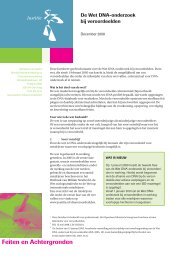<strong>INTERPOL</strong> <strong>DNA</strong> UNIT<strong>AND</strong> M<strong>ON</strong>ITORING EXPERT GROUP• originThe <strong>INTERPOL</strong> <strong>DNA</strong> Unit was established at the General Secretariat in Lyon inMarch 2000 in response to demands by many of <strong>INTERPOL</strong>’s 188 member countries.The primary project was to establish a group of experienced external advisors towork with <strong>INTERPOL</strong> to implement international best practice guidelines andinternational <strong>DNA</strong> data exchange, thus creating the <strong>INTERPOL</strong> <strong>DNA</strong> MonitoringExpert Group (MEG). The Monitoring Expert Group is a panel of forensic experts andsenior investigators which advises <strong>INTERPOL</strong> and encourages authorities in membercountries to implement or expand national databases. It also aims to standardizecollection efforts and to promote accreditation criteria for forensic laboratories toensure the integrity of samples. With their support and guidance <strong>INTERPOL</strong> has so farmanaged to achieve the following:• recommendation of the ISSOL (<strong>INTERPOL</strong> Standard Set of Loci) worldwide (seeAppendix 1). This standard was created to encourage countries to use a core set ofloci that would facilitate international comparison. The ISSOL also allows for theidentification of individuals but not for the extraction of personal information, apartfrom gender.• establishment of the <strong>INTERPOL</strong> <strong>DNA</strong> Gateway• development of the <strong>INTERPOL</strong> <strong>DNA</strong> Database• installation of the G8 I-24/7 <strong>DNA</strong> SRN (Search Request Network for laboratoriesin G8 countries)• management of 19 <strong>DNA</strong> MEG meetings• organization of five International <strong>DNA</strong> Users’ Conferences for InvestigativeOfficers• arranging seven regional <strong>DNA</strong> workshops or conferences• performing three global <strong>DNA</strong> Surveys• publication of the <strong>INTERPOL</strong> <strong>DNA</strong> Handbook, Training DVD and <strong>DNA</strong> surveyReports• issuing advice for criminal investigations under the UN Mandate• providing assistance to <strong>DNA</strong>-led international Disaster Victim Identificationoperations.<strong>INTERPOL</strong> proactively promotes <strong>DNA</strong> profiling as a highly valuable and relativelyeconomical forensic identification tool and by doing so has increased the interest in thisinvestigative support technique around the world, in particular in developing countriesand regions.PAGE 8<strong>INTERPOL</strong> <strong>DNA</strong> UNIT<strong>AND</strong> M<strong>ON</strong>ITORING EXPERT GROUP
•the dna databaseThe <strong>INTERPOL</strong> <strong>DNA</strong> Database was developed in 2002. According to the latest Global<strong>DNA</strong> Survey, 54 member countries are operating national <strong>DNA</strong> databases, with54 countries currently populating the <strong>INTERPOL</strong> <strong>DNA</strong> Database. The <strong>DNA</strong> Databaseis used in police investigations to search a <strong>DNA</strong> profile against all other internationalprofiles that have been submitted for unsolved crime stains, convicted offenders,suspects, unidentified bodies and missing persons. Each country retains ownership ofits profile data and controls its submission, destruction and access by other countriesin accordance with their national laws.In respect of data confidentiality, an important parameter in the <strong>INTERPOL</strong> <strong>DNA</strong>Database is that profiles are searched without the name of the person to whom theprofile belongs. When there is a database match, the countries concerned are informedand invited to co-operate bilaterally should they choose to pursue the investigation.This procedure ensures that only when there is a match in the <strong>INTERPOL</strong> <strong>DNA</strong>Database will the identification and circumstances of the suspect be revealed betweenthe countries concerned, should they so decide. Also, to ensure the quality, andtherefore reliability of <strong>DNA</strong> profiles, countries must declare if the <strong>DNA</strong> profile wasproduced in an accredited laboratory.Access to the <strong>DNA</strong> Gateway is provided directly to a country via the <strong>INTERPOL</strong> NationalCentral Bureau (NCB) using <strong>INTERPOL</strong>’s I-24/7 secure police communications system.Member countries also have the technical possibility for direct access to the databasefrom the NCB or another authorized entity such as a national forensic institute.•dna gateway success storyOn 31 January 2006, four individuals committed an armed robbery in a jewellery storein Vaduz, Liechtenstein, leaving with merchandise and cash with a value of more thanone million Swiss Francs, approximately EUR 620,000. One suspect was arrested butmanaged to escape from the Vaduz prison on 19 July of the same year with the help oftwo men, one of whom is suspected of having taken part in the armed robbery.Following these events and investigation by the Liechtenstein Police and <strong>INTERPOL</strong>’sNational Central Bureau in Vaduz, the NCB issued diffusions (alerts to countries),and later requested the issuance of <strong>INTERPOL</strong> Red Notices, or international wantedpersons alerts, for four individuals, three of them from Serbia and one from Croatia.The Police provided photographs, fingerprints and <strong>DNA</strong> profiles for each of thefour wanted individuals. This information was stored in <strong>INTERPOL</strong>’s databases and isaccessible by 188 member countries.Less than a year later, on 19 April 2007, <strong>INTERPOL</strong> received 14 <strong>DNA</strong> profiles fromthe United Arab Emirates Police in relation to an armed robbery in a jewellery storein Dubai, United Arab Emirates. They requested an urgent check against <strong>INTERPOL</strong>’s<strong>DNA</strong> Database.<strong>INTERPOL</strong> <strong>DNA</strong> UNIT<strong>AND</strong> M<strong>ON</strong>ITORING EXPERT GROUPPAGE 9







